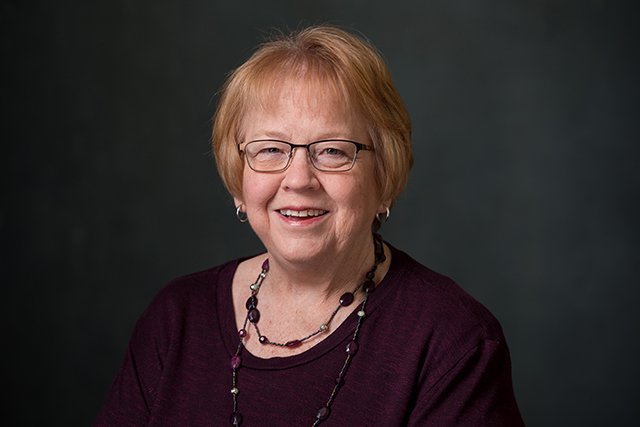
Because of CPR Lawrence woman's survival called a miracle.
By Caroline Trowbridge, Lawrence Memorial Hospital
For Phyllis Wheeler, the day was much like any other. She was looking

This annual event focuses attention on heart health during February, which is American Heart Month. Lawrence Memorial Hospital and Cardiovascular Specialists of Lawrence are medical sponsors, and Truity Credit Union is the employee wellness sponsor.
Tickets are available online at “Go Red for Women Lawrence Luncheon,” or by visiting any Truity Credit Union.
This year’s event will be Friday, February 9, in the Ballroom of the Kansas Union. Here are more details about this year’s Go Red:
10 a.m. to 11:30 a.m.: registration, expo booths, auction.
11:30 a.m. to 1 p.m.: luncheon, featuring Robin Ward talking about CPR and Erica Post, who is a nurse practitioner at Cardiovascular Specialists of Lawrence, talking about heart health for women.
forward to attending her granddaughter’s basketball game at Free State High School after she left work at Animal Hospital of Lawrence.
Shortly before 4 p.m., she made the 10-minute drive to the school and parked. She remembers the bitter weather on that Tuesday afternoon last February.
“It was cold, and the wind was blowing, and it was hard to breathe,” she said.
Wheeler walked across parking lot to the warm building. Inside, she picked up a game program. Then it happened. She collapsed.
“I don’t remember grabbing my chest or feeling any pain,” she said recently.
In fact, she remembers nothing about the next several days. She had no idea her heart had stopped and she wasn’t breathing. She had no idea Free State’s athletic trainer Meghan Chaffin ran to start CPR. She had no idea paramedics quickly arrived to continue heart compressions and rushed her to Lawrence Memorial Hospital’s Emergency Department.
Although she didn’t know many, many people were so focused on saving her life, she certainly is glad they were.
“Everyone says it’s a miracle that I’m still alive, and had it not been for the trainer and being at Free State, I would not have been,” Wheeler said.
Chaffin, one of a cadre of LMH athletic trainers who work at area high schools, and the others who helped know the difference that CPR can make.
“The minute you know there’s no pulse on a patient, you should do CPR,” said Dr. Christina Salazar of Cardiovascular Specialists of Lawrence. “That’s part of the reason Phyllis is still alive – the early CPR.”
It was imperative Wheeler’s heart started again – to save her heart muscle and to save her brain. Dr. Roger Dreiling, an interventional cardiologist with Cardiovascular Specialists of Lawrence, notes that fewer than 10 percent of the people who suffer a heart attack outside of a hospital survive and go home without any damage to their hearts or brains.
“If there’s any hero in this story,” he said, “it was whoever was doing CPR. You frequently can save the heart, but you can’t save the brain. Without CPR, she may have regained blood circulation, but she may not have regained her brain. So the fact that there was CPR is what makes it so she can talk and walk and think and have personality.”
At LMH, physicians determined Wheeler had a trifecta of serious health issues. Her heart’s left main artery was so substantially narrowed by plaque that she had that heart attack at Free State.
“That was a widow-maker – or widower-maker in this case,” Dr. Dreiling said.
He opened Wheeler’s narrowed artery, which made an immediate and significant different. But physicians also detected pneumonia, which further reduced blood flow to her heart. And she had sepsis, a life-threatening inflammation that sometimes occurs when people are fighting an infection. So she remained in the LMH Intensive Care Unit as she fought the pneumonia and sepsis.
“This is a very good example of having a deadly cardiac disease and not having symptoms,” Dreiling said. “The reality is: You can have significant heart disease and not know it.”
Wheeler, whose only indicator was shortness of breath, was shocked. She had no clue she was critically ill. Typically, Dr. Salazar said, she sees two types of cardiac patients: those who have had symptoms during exercise for a period of time, and those like Wheeler who have a sudden event.
After her experience, she encourages everyone to see their primary care physician annually and to get help if heart issues arise.
“I’m thankful to be here,” she said.
Now, Wheeler’s heart is back to normal. And that’s because of quick action at Free State High School, a quick response from the ambulance crew and life-saving measures at LMH.
“Phyllis Wheeler is walking and talking – as opposed to being in a nursing home being fed by someone else – because somebody grabbed the bull by the horns (and started CPR),” Dr. Dreiling said. “The fact that she is walking and talking and carrying on a normal life is a miracle. It’s just a miracle.”
— Caroline Trowbridge is marketing communications manager for Lawrence Memorial Hospital, which is a major sponsor of Lawrence Journal-World’s health focus. She can be reached at caroline.trowbridge@lmh.org.